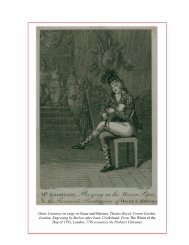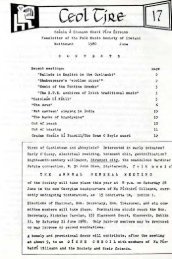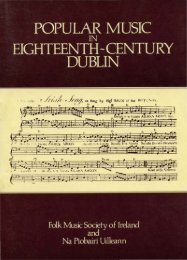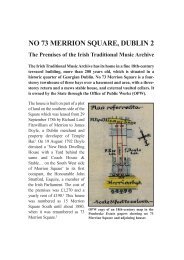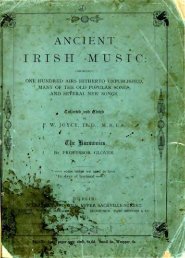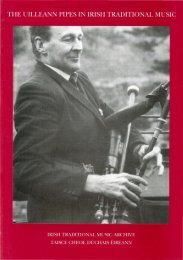Union Pipes - Irish Traditional Music Archive
Union Pipes - Irish Traditional Music Archive
Union Pipes - Irish Traditional Music Archive
Create successful ePaper yourself
Turn your PDF publications into a flip-book with our unique Google optimized e-Paper software.
93<br />
SOMe COnSIDerATIOnS ArISIng<br />
concerned, although not otherwise. As said, his audience in Vauxhall<br />
gardens a few days later found his music ‘single and novel’, and a<br />
contemporary writer considered that ‘his ingenuity seems to have<br />
made a new discovery in Instrumental <strong>Music</strong>’. The pipes that these<br />
londoners heard however would not have been new to his <strong>Irish</strong><br />
audiences, to the poor compatriots in london whose company he frequented,<br />
or to the provincial audiences among whom he had first<br />
made a reputation in Britain. They are unlikely to have been<br />
particularly new to those in Britain who had been hearing <strong>Irish</strong> pipes<br />
played informally and in private for some decades, such as lady<br />
luxborough in 1751, the British king george II before 1760, 340 the<br />
Scottish highland piper Joseph MacDonald writing in 1760, blind<br />
James Mullin’s audiences in the george Inn in Derby in 1766, the<br />
employers of the young servant piper with the ‘real old egan in<br />
Dublin’ set of pipes in 1779, the British music historian Charles<br />
Burney studying the instrument about 1785, 341 the artist and musician<br />
John Baptist Malchair sketching a ‘blind <strong>Irish</strong> piper’ and writing<br />
tunes from him in Oxford in 1785, 342 or the <strong>Irish</strong> slum celebrants of<br />
St Patrick’s Day in london in 1786.<br />
What was really new was the term ‘union pipes’, and under this term<br />
the audacious introduction to an elite audience, in classical music<br />
terms, of an improved form of an alien instrument often associated<br />
with the lower classes. There is nowadays a consensus, highly plausible<br />
but based seemingly on deduction rather than on any precise<br />
evidence, that an early eighteenth-century low-pitched and<br />
340<br />
Walker 1786: 81: ‘I have been informed that george II was so much delighted<br />
with the performance of an <strong>Irish</strong> gentleman on the Bagpipes, that he ordered a<br />
medal to be struck for him’. King george II died in 1760.<br />
341<br />
letter to Joseph Cooper Walker, quoted in Walker 1786: 78–9.<br />
342<br />
Wollenberg 2007: 151–61.



